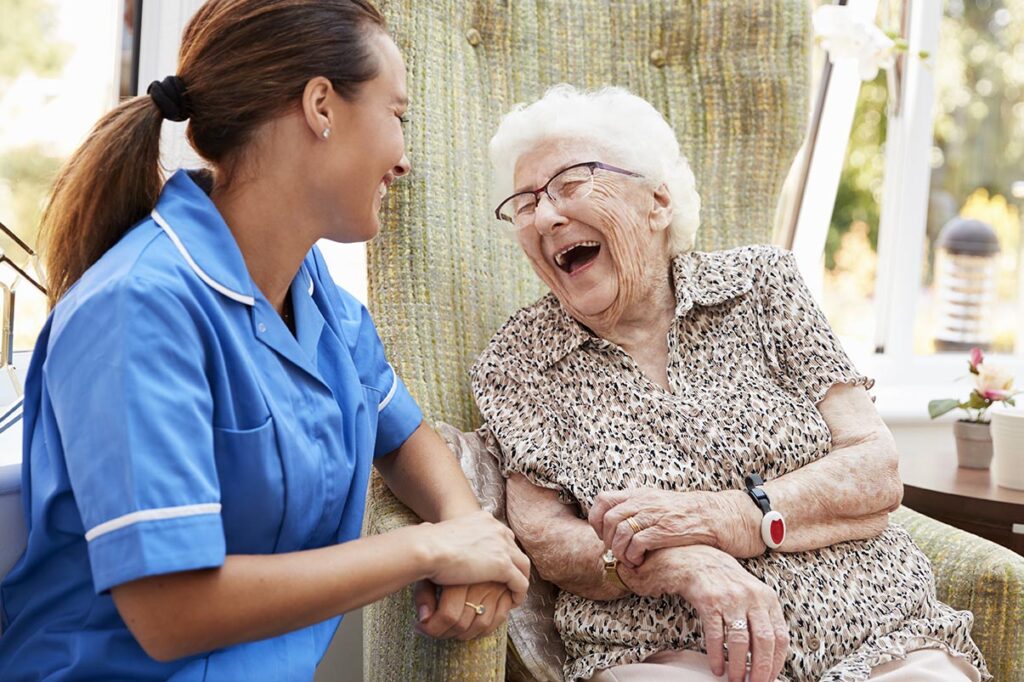Fall Prevention Strategies for Aging Adults
Brought to you by Angel Health Care Service
“I can’t get to my tomatoes anymore,” Frank said during the family’s weekly video call, gesturing toward the garden visible through his kitchen window. His daughter Sarah watched her 78-year-old father’s frustration as he explained how the back corner had become “too tricky to navigate.” Meanwhile, her mother Margaret had quietly stopped her daily walks to check the mail—the slightly sloped walkway that had seemed charming for 30 years now felt dangerous with morning dew and fallen leaves making it slippery, turning what had been a cherished way of connecting with neighbors into a source of anxiety about falling.
Sarah’s story is one many families recognize. As we age, changes in balance, vision, and mobility increase the risk of injury from falls—especially outdoors. At Angel Health Care Service, we believe aging adults deserve to remain connected to the spaces they love, safely. In honor of Home Safety Month, we’re sharing practical fall prevention strategies that make outdoor areas safer and more accessible for seniors.

Reframing Our Approach as Family Caregivers
It’s easy to assume that outdoor spaces should be off-limits as our loved ones age. But instead of focusing on limitations, what if we asked:
“How can we help them keep enjoying the places they’ve cherished for years?”
Outdoor areas often hold precious memories—gardens planted over decades, garages filled with tools from weekend projects, and porches where neighbors stopped by for coffee. When physical challenges threaten access to these spaces, older adults risk losing not only their mobility but also their independence, purpose, and joy.
At Angel Health Care Service, our approach is different. Rather than restricting access, we support aging adults with thoughtful modifications that keep these spaces safe, meaningful, and enjoyable.
Gardens That Welcome and Protect
For many older adults, gardening is a beloved activity that brings peace, creativity, and a deep connection to nature. But uneven ground, decorative mulch, or shifting stones can present new challenges with age.
We recommend working with your loved one to preserve their gardening routines by:
- Widening paths to at least 36 inches for safe walker or wheelchair access
- Leveling surfaces and replacing loose gravel or mulch with compacted materials or pavers
- Installing handrails along garden paths for added stability
- Trimming overgrowth to prevent encroaching branches or plants from becoming tripping hazards
- Adding motion-sensor lighting for early morning or dusk visits
These changes are not limitations—they are enhancements that help make gardening sustainable and safe for years to come.
Safe and Accessible Garage Spaces
Garages often serve as more than just storage—they’re creative spaces, work areas, or alternate entrances to the home. But dim lighting, clutter, or slippery floors can increase fall risk.
To maintain both safety and function, we recommend:
- Organizing tools and items at reachable heights
- Using pegboards to keep frequently used tools visible and accessible
- Installing bright LED lighting to eliminate dark corners
- Providing sturdy stools with arms for seated tasks
- Laying non-slip mats in high-traffic or moisture-prone areas
Simple adjustments like these can help aging adults feel confident and secure in garage spaces they value.
Making Outdoor Living Safer
Backyards, patios, and porches are favorite places for sipping coffee, feeding the birds, or visiting with family. But subtle hazards—uneven ground, loose boards, or cluttered walkways—can pose fall risks.
We suggest:
- Walking the yard together monthly to spot new hazards such as low spots, sprinkler heads, or exposed roots
- Repairing cracked concrete or loose boards on patios and decks
- Checking handrails and porch steps regularly for sturdiness
- Rearranging furniture to create wide, clear paths
- Marking changes in surface elevation with bright paint, reflectors, or lighting
These preventive steps ensure that outdoor spaces remain a safe part of daily life.
Collaborating With Seniors to Create Solutions
Fall prevention isn’t about taking away independence—it’s about preserving it. That’s why at Angel Health Care Service, we emphasize collaboration. The most effective safety strategies are developed through respectful conversation and shared decision-making.
Whether you’re supporting a parent, spouse, or client, your role as a caregiver is vital. When we listen to our loved ones and tailor solutions to their lifestyles and preferences, fall prevention becomes a tool for empowerment—not restriction.
Quick Outdoor Fall Prevention Checklist
Essential Safety Checks
- Pathways: Level, well-lit, and at least 36 inches wide
- Lighting: Motion-activated or dusk-to-dawn fixtures for walkways and entry points
- Handrails: Installed along steps, slopes, and uneven paths
- Surfaces: Replace unstable materials with compact, non-slip options
- Clutter: Keep walkways clear and organize tools and equipment
- Repairs: Promptly fix cracks, loose boards, or unstable transitions
Quick Actions
- Walk the property with your loved one monthly to identify changes
- Arrange outdoor furniture to ensure wide, clear walkways
- Clearly mark elevation changes or transitions between surfaces
- Keep emergency contacts and mobile phones easily accessible when outdoors
Angel Health Care Service Is Here to Help
At Angel Health Care Service, we understand the importance of helping seniors remain safe and confident in their homes—inside and out. Our trained caregivers can assist with:
- Personalized home safety assessments
- Fall prevention planning tailored to each individual’s needs
- Compassionate, professional support for daily activities
To learn more or schedule a free in-home consultation, visit our website or contact your local Angel Health Care Service office today.
Let’s work together to make outdoor living safe, joyful, and accessible for the seniors we love.
